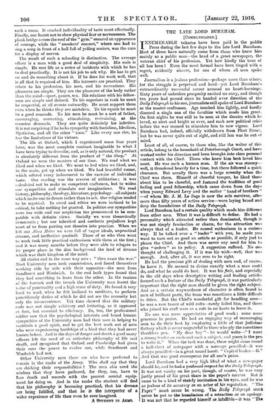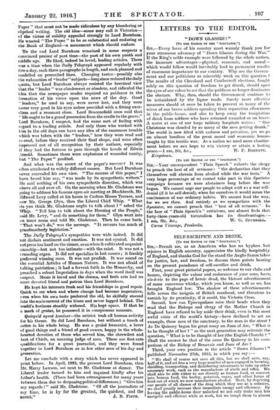I NNUMERABLE tributes have been paid in the publio Press during
the last few days to the late Lord Burnham. Most of these have naturally come from those who knew him mainly as a public man—the head of a great newspaper, the veteran chief of his profession. Yet how kindly the tone of all has been 1 Even the most formal have been tinged with a regret, evidently sincere, for one of whom all men spoke well.
Journalism is a jealous profession—perhaps more than others, for the struggle is perpetual and hard—yet Lord Burnham's extraordinarily successful career aroused no heart-burnings. Sixty years of unbroken prosperity excited no envy, and though
ten years had passed since he handed over direction of the Daily Telegraph to his son, journalists still spoke of Lord Burnham as the master-craftsman Age touched him lightly, and hardly, dimmed a single one of the faculties which made him great. On first nights he was still to be seen at the theatre which ho loved, as alert and bright as ever, and each new political crisis before the war seemed to stimulate him to new vigour. Lord Burnham had, indeed, officially withdrawn from Fleet Street, but he was never quite out of sight, and still less was he out of
mind.
Least of all, of course, to those who, like the writer of this article, belong to the household of Peterborough Court, and have worked under his direction and been brought into close personal contact with the Chief. Those who knew him best loved him most. He was such a human man. If the air was stormy— well, it thundered heavily for a time, but there followed a quick clearance. But usually there was a large serenity when the Chief was there. Himself of cheerful temper, he hied those about him to be cheerful, and fostered the tradition of good feeling and good fellowship, which came down from the days when young Edward Levy and the earlier " band of brothers " —of whom Mr. 3. M. Le Sage is now the sole survivor, after more than fifty years of active service—were laying broad and deep the foundations of the Daily Telegraph.
Lord Burnham had a certain quality which made him different from other men. What it was is difficult to define. He had a personality which attracted rather than dominated, though it was not simply fascination or charm, for the attraction was always that of a leader. He roused enthusiasm in a curious way. If he talked over a " leader " with you, he made you want to turn out as good an article as possible, if only just to please the Chief. And there was never any need for him to give orders " as to policy. A suggestion sufficed. No one thought of challenging it. If it was his wish—well, that was enough. And, after all, it was sure to be right.
He had the precious gift of dealing with men and, of course, he knew it. He seemed to divine exactly what a man could do, and what he could do best. It was his flair, and especially in the old days when descriptive writing and leading articles formed such a feature of the Daily Telegraph, it was particularly important that the right man should be given the right subject. And as a certain waywardness of character is often found in men of brilliant parts, the team was sometimes a little difficult to drive. But the Chiefs wonderful gift for handling men— he was a rare tamer of wild colts—rarely failed him, and those who joined his staff were as a rule in no haste to leave it.
No one was more appreciative of good work ; none more generous in praise. He had an engaging way of encouraging men to do their best by employing a little of that judicious flattery which is never ungrateful to those who ply the sometimes thankleis pen. " My dear boy "—he would write—" I want a strong leader on such-and-such a subject. and yours is the pen to write it." When the task was done, there might come round a half-sheet of notepaper with a message pencilled—it was always pencilled—in a. great round hand: " Capital leader.—B." And that was good recompense for all one's pains.
Lord Burnham had a very high ideal of what a newspaper
should be, and he had a profound respect for the Daily Telegraph. It was not vanity on his part, though, of course, he was very justly proud of his great share in the paper's success. But it came to be a kind of stately institution in his eyes, and he was as jealous of its accuracy as an actor of his reputation. The Paper" must never be wrong. Tho Datig Telegraph must never be put to the humiliation of a retraction or an apology. It was not that he regarded himself as infallible—it was " The
Paper" that must not be made ridiculous by any blundering or slipshod writing. The old idea—some may call it Victorian— of the virtue of solidity appealed strongly to Lord Burnham. He wanted " The Paper " to be as substantial and enduring as the Bank of England—a monument which should endure.
To the end Lord Burnham remained in some respects a convinced praiser of past time—the past of his own youth and middle age. He liked, indeed he loved, leading articles. There was a time when the Daily Telegraph appeared regularly with live a day, each three paragraphs in length, and each planned and modelled on prescribed lines. Changing tastes—possibly also the exhaustion of " leader " subjects—long since reduced the daily quota, but Lord Burnham always resisted the heretical view that the " leader " was obsolescent or obsolete, and ridiculed the idea that the newspaper reader required no guidance in the formation of his views upon the news of the day. Good "leaders," he used to say, were never lost, and they were never very good in his eyes unless provided with a fitting exor- dium and a resonant close. Lord Beaconsfield once said that "life ought to be a grand procession from the cradle to the grave." Lord Burnham, I suspect, had the same sort of feeling with regard to a leading article. And only those who worked with him in the old days can have any idea of the enormous trouble which was taken with the " leaders," how they were read and re-read, before they received their final shape, and were often improved out of all recognition by their anthem, especially if they had the fortune to pass through the hands of Edwin Arnold. Sometimes there were explosions of wounded vanity, but "The Paper" profited.
And what was the secret of the paper's success ? It was often attributed to widely different causes. But Lord Burnham never concealed his own view. " The success of this paper," I have beard him say, "was made by its sympathetic writers." He said nothing of his own sympathetic direction, which was above all and over all. On the morning when Mr. Gladstone was going to address his famous open-air meeting at Blackheath, Mr. Edward Levy called at his house in Carlton House Terrace, and saw Mr. George Glyn, then the Liberal Chief Whip. " What do you think Mr. Gladstone ought to talk about ? " asked the IVhip. " Tell him to talk about the Housing of the People," said Mr. Levy, " and do something for them." Glyn went into an inner room and told Mr. Gladstone. Then he came back. "That won't do," was the message. " It savours too much of grandmotherly legislation."
The Daily Telegraph's sympathies were wide indeed. It did not disdain sentiment and emotion. It was not cynicaL It did not press too hard on the sinner, even when it cultivated acquaint- anceship—but not too intimate—with the saint. It was not a crusading organ. It did not specialize in lost causes ; it frankly preferred winning ones. It was not prudish. It was sound on the essential Articles of Human Nature. It was not afraid of
patriotism ; it had a fervent faith in the Monarchy, and _preached a robust Imperialism in days when the word itself was suspect. Music it loved and the drama, and both arts had no more devoted friend and patron than Lord Burnham.
He kept his interests fresh and his friendships in good repair. Quick to see when and where change had become imperative, even when his own taste preferred the old, he skilfully steered into the main current of the times and never lagged behind. The world's horizons steadily widened. His kept apace. If that be a mark of genius, he possessed it in conspicuous measure.
Quicguicl clung homines—the satirist took all human activity for his theme. So did Lord Burnham, but without a touch of satire in his whole being. He was a genial humanist, a lover of good things and a friend of good causes, happy in the whole- hearted devotion of those who served him, the shrewdest and best of Chiefs, an unerring judge of men. These are first-rate qualifications for a great journalist, and they were found together in Lord Burnham as in few other men of his day and generation.
Let me conclude with a story which has never appeared in print before. In April, 1893, the present Lord Burnham, then Mr. Harry Lawson, sat next to Mr. Gladstone at dinner. The Liberal leader turned to him and inquired kindly after his father's health. (There had been estrangement for many years between them due to deepeningpolitic,aldifferences.) "Give him my regards ! " said Mr. Gladstone. " Of all the journalists of my time, he is by far the greatest, the quickest, and the



































 Previous page
Previous page